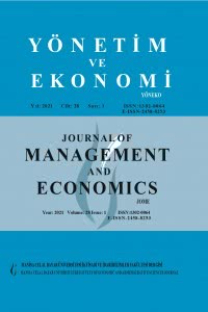Ekonomik Büyüme ve Teknolojik Gelişmeler: Bir Nedensellik Analizi
Economic Growth and Technological Development: A Causality Analysis
___
- Ansal, H. (2004). Geçmiş ve Gelecekte Ekonomik Gelişmede Teknolojinin Rolü: Teknoloji Kitabı İçerisinde, Ankara: Türk Mühendis ve Mimar Odaları Birliği (Tmmob) 50. Yıl Yayınları.
- Basalla, G. (2000). Teknolojinin Evrimi, 8. Baskı, Ankara: TÜBİTAK Yayınları.
- Basant, R. and Fikkert, B. (1996). The Effects of R&D, Foreign Technology Purchase and Domestic and International Spillovers on Productivity in Indian Firms, The Review of Economics and Statistics, 78 (2), 187-199.
- Bottazzi, L. and Peri, G. (2005). The International Dynamics of R&D and Innovation in the Short and in the Long Run, NBER Working Paper, No: 11524.
- Breusch, T.S. and Pagan, A.R. (1980). The Lagrange Multiplier Test and Its Applications to Model Specification Tests in Econometrics, Review Of Economic Studies, 47, 239-253.
- Christiansen, L. E. (2008). Do Technology Shocks Lead to Productivity Slowdowns? Evidence from Patent Data, IMF Working Paper, No: 08/24.
- Coombs, R., P. Saviotti and V. Walsh (1987). Economics and Technological Change, London: Mac Millan Press.
- Dosi, G. (1988). Sources, Procedures and Microeconomic Effects of Innovation, Journal of Economic Literatüre, 26.
- Dumitrecu, E-I. and Hurlin, C. (2012). Testing for Granger Non-Causality in Heterogeneous Panels. Economic Modelling. 29 (4): 1450–1460.
- Guellec, D. and Potterie, B. V. P. D. L. (2001). R&D and Productivity Growth: Panel Data Analysis of 16 OECD Countries, OECD Economic Studies, No: 33. http://Databank.Worldbank.Org/Data/
- Justman, M. and M. Teubal (1991). A Structuralist Perspective on the Role of Technology in Economic Growth and Development, World Development, 19.
- Marchetti, D. J. and Nucci, F. (2005). Price Stickiness and the Contractionary Effect of Technology Shocks, European Economic Review, 49 (5), 1137-1163.
- Nelson, R. R. (1981). Research on Productivity Growth and Productivity Differences: Dead Ends and New Departures, Journal of Economic Literature, 3.
- Noy, I. and Nualsri, A. (2007). What Do Exogenous Shocks Tell Us about Growth Theories?, Santa Cruz Center for International Economics (SCCIE) Working Paper, 7-16.
- Pesaran, M. H. (2006). A Simple Panel Unit Root Test in the Presence of Cross Section Dependence, Cambridge Working Papers in Economics, No: 0346.
- Pesaran, M. H. and Yamagata, T. (2008). Testing Slope Homogeneity in Large Panels, Journal of Econometrics. 142 (1): 50-93.
- Schumpeter, J. A. (1966). Kapitalizm, Sosyalizm ve Demokrasi- I, İstanbul: Varlık Yayınları.
- Shea, J. (1998). What Do Technology Shocks Do?, NBER Working Paper Series, No: 6632.
- Soyak, A. (1995). Teknolojik Gelişme: Neoklasik ve Evrimci Kuramlar Açısından Bir Değerlendirme, Ekonomik Yaklaşım, Cilt 6, 15.
- ISSN: 1302-0064
- Yayın Aralığı: Yılda 4 Sayı
- Yayıncı: Manisa Celal Bayar Üniversitesi İktisadi ve İdari Bilimler Fakültesi
Robotların Yükseliş Trendi Ekonomiyi ve Geleceği Nasıl Etkileyecek?
Dilek GÖNÇER DEMİRAL, Meltem İNCE YENİLMEZ
Turist Rehberlerinin Mesleki Performansının Turistlerin Memnuniyetine Etkisi
Ayşe ARSLAN, Abdullah TANRISEVDİ
Ekonomi Politika Belirsizliği İthalat Üzerinde Etkili midir? Panel Veri Analizinden Kanıtlar
Ekonomik Büyüme ve Teknolojik Gelişmeler: Bir Nedensellik Analizi
Aslı KARATAŞ, Kurtuluş BOZKURT
Margaret Atwood'un Kalp Gidince Romanında Özgürlük ve Güvenlik İkilemi
COVID-19 Sürecinde İhracat ve Hava Kargo Taşımacılığı: Antalya Havalimanı Üzerine Bir Araştırma
Akademisyenin Mutluluk Düzeyine Etki Eden Faktörlerin Belirlenmesi: Ölçek Geliştirme Araştırması
Fatma YAPICI SAPANKAYA, Haluk TANDIRCIOĞLU
Cumhurbaşkanlığı Hükümet Sisteminin Milli Güvenlik Kurulu Üzerindeki Etkileri
